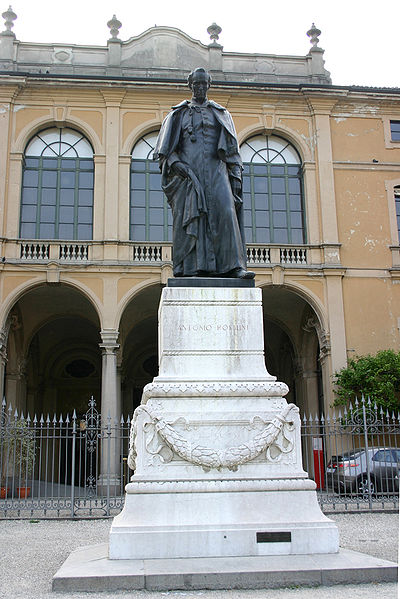<Back to Index>
- Philosopher Antonio Rosmini - Serbati, 1797
- Poet José Ignacio Javier Oriol Encarnación de Espronceda y Delgado, 1808
- Grand Prince of Moscow Vasili III Ivanovich, 1479
PAGE SPONSOR

Blessed Antonio Rosmini - Serbati (March 25, 1797 - July 1, 1855) was an Italian Roman Catholic priest and philosopher. He founded the Rosminians, officially the Institute of Charity or Societas a charitate nuncupata.
Born at Rovereto in the Austrian Tyrol, he belonged to a noble and wealthy family. At an early age decided to enter the priesthood. After studying at Pavia and Padua, he was ordained priest in 1821.
In 1848 Rosmini was invited to serve in the Roman Curia of Pius IX as prime minister of the Papal States. He participated in the intellectual struggle which had for its object emancipation from Austria,
but as a trusted ecclesiastical advisor and diplomat he was not an
initiator of the movement which ended in the freedom and unity of
Italy. In fact, while eager for the deliverance of Italy from Austria,
his aim was to bring about a confederation of the states of the
country, which was to be under the control of the pope. However upon
establishment of the Roman Republic,
the Pontiff was forced to flee and became estranged from his former
advisor in political matters. The tenuous political circumstances made
it very difficult to reconcile the two men's differing projects:
innovative social and juridical reforms, however modest, fell victim to
the more pressing existential needs of defending the supremacy of the
Church's temporal powers. Rosmini's works, Of the five wounds of the Holy Church and The Constitution of Social Justice, aroused great opposition, especially among the Jesuits, and in 1849 they were placed upon the Index. Rosmini at once declared his submission and retired to Stresa on Lago Maggiore,
where he died. Before his death he had the satisfaction of learning
that the works in question were dismissed, that is, proclaimed free
from censure by the Congregation of the Index. Twenty years later, the
word dismissed (dimittantur) became the subject of controversy,
some maintaining that it amounted to a direct approval, others that it
was purely negative and did not imply that the books were free from
error. The controversy continued until 1887, when Leo XIII finally condemned forty of his propositions and forbade their being taught. The English translation of Rosmini's works is being edited in Durham, UK. The most comprehensive view of Rosmini's philosophical standpoint is to be found in his Sistema filosofico,
in which he set forth the conception of a complete encyclopaedia of the
humanely knowable, synthetically conjoined, according to the order of
ideas, in a perfectly harmonious whole. Contemplating the position of
recent philosophy from Locke to Hegel,
and having his eye directed to the ancient and fundamental problem of
the origin, truth and certainty of our ideas, he wrote: "If philosophy
is to be restored to love and respect, I think it will be necessary, in
part, to return to the teachings of the ancients, and in part to give
those teachings the benefit of modern methods". He examined and analysed the fact of human knowledge, and obtained the following results: In 1828 he founded a new religious community, the Institute of Charity, known generally since as the Rosminians. The
members might be priests or laymen, who devoted themselves to
preaching, the education of youth, and works of universal
charity — material, spiritual and intellectual. They work in Italy, England, Ireland, France, Wales, New Zealand, Kenya, Tanzania, India, Venezuela, and America. In London they are attached to the historical Church of St Etheldreda, Ely Place, Holborn. In 1962, Rosmini College School for Boys was founded in Auckland, New Zealand, by Father Catcheside.
On 26 June 2006, Pope Benedict XVI signed a Decree of the heroic virtues, and hence declared Rosmini to be Venerable. On 3 June 2007, Pope Benedict XVI authorized the promulgation of a decree approving Rosmini's beatification. On November 18, 2007, he was beatified in Novara, Italy.